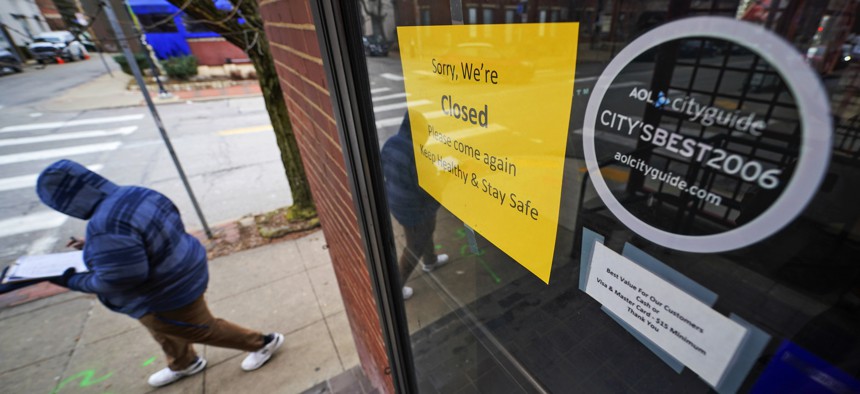Pennsylvania Voters to Decide Whether to Limit Governor’s Emergency Powers

A sign hangs on the door of the Union Grill, temporarily closed due to COVID-19, in the Oakland neighborhood of Pittsburgh on Thursday, Jan. 28, 2021. AP Photo/Gene J. Puskar
GOP lawmakers unsuccessfully challenged the Democratic governor’s emergency authority during the coronavirus pandemic. Now they’ve approved a bill that sets up a referendum on the issue.
Voters in Pennsylvania will decide later this year whether to curtail the governor’s emergency powers after state lawmakers approved a bill that puts two possible restrictions on the ballot.
The Republican-backed move comes as state legislatures across the country have sought to rein in governors’ sweeping use of executive orders during the coronavirus pandemic.
One of the Pennsylvania ballot measures would limit a governor’s emergency declaration to 21 days unless the state legislature passes a resolution to extend the order.
The other measure would allow the legislature to extend or terminate an emergency declaration with a two-thirds majority vote—explicitly giving lawmakers the ability to end a declaration without the governor’s signature.
Democratic Gov. Tom Wolf issued a Covid-19 disaster declaration on March 6, which has been the basis for lockdowns and the closure of businesses and schools during the course of the pandemic. The state’s constitution currently allows a governor’s emergency declaration to last up to 90 days and the emergency can be indefinitely extended. Wolf has extended his declaration three times since the initial order.
Republican lawmakers in the state—who control both chambers of the legislature—tried unsuccessfully to challenge Wolf’s emergency authority last year. The Pennsylvania Supreme Court ruled in July that the legislature cannot unilaterally terminate the governor’s emergency powers by resolution.
Lawmakers in at least 33 states have proposed legislation this year that would limit gubernatorial powers during the pandemic and other emergencies, according to the National Conference of State Legislatures.
One of the supporters of the Pennsylvania legislation to curtail the governor’s emergency powers said it would improve cooperation between the branches of government.
“An emergency declaration is meant to be used to address immediate dangers in a very timely manner, not to be extended indefinitely,” said Rep. Seth Grove. “A long-lasting declaration undermines our system of government by allowing one person to make decisions that impact all Pennsylvanians.”
But Democrats said the initiative would delay the ability of the state to respond to future emergencies.
“In no way is this body equipped to make decisions in any sort of urgent manner,” Pennsylvania Sen. Katie Muth told WHTM-TV.
Wolf has spoken out against the effort to curtail his emergency authority and previously said that if the initiative was used to terminate his coronavirus emergency declaration, it would threaten progress the state has made in combating the spread of the virus and could put the state’s receipt of federal aid in jeopardy.
The Pennsylvania House approved the bill on Friday in a 116-86 vote, putting the two measures on the ballot. The Senate approved it the week before in a 28-20 vote.
The initiatives will be placed on the ballot for a May 18 primary election.
The governor’s office did not respond to a request for comment about the passage of the bill by the legislature, but Wolf has previously said he would oppose the effort “through every means possible.”
Andrea Noble is a staff correspondent with Route Fifty.
NEXT STORY: Study: $15 Minimum Wage Would Result in Fewer Jobs, Less Poverty





